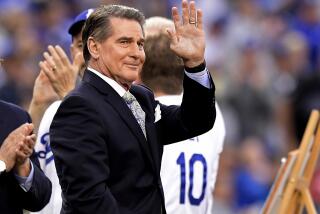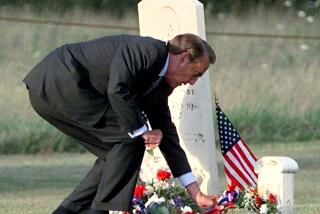Sen. Gore, 39, Is Youngest in President Race
- Share via
WASHINGTON — Tennessee Sen. Albert Gore Jr., 39, said Friday that he will enter the 1988 Democratic presidential contest, bringing with him an ambitious agenda of policy goals and potentially formidable appeal in key primary states in his native South.
The newest White House contender, who has earned a reputation on Capitol Hill for seriousness, energy and ambition, read from a statement of intentions that was scribbled on yellow legal-size paper. His wife, Mary Elizabeth (Tipper) Gore, their four children and his mother were by his side while his father, who served in the Senate until 1970, was back home making a speech in his son’s place.
7 Candidates Slated
Gore appeared in the same Senate caucus room where another freshman Democratic senator, Paul Simon of Illinois, joined the presidential competition Thursday. Gore’s decision, made after three weeks of pondering his political future, raised the number of declared and anticipated Democratic candidates to seven.
But Gore, along with black leader Jesse Jackson, are the only ones of the group to hail from the South. Thus, by some analyses, he is very well positioned to exploit the opportunity presented by the regional “super primary” next March 8, when 14 Southern states will choose about 30% of the delegates to the Democratic National Convention.
Asked whether he plans a Southern strategy, Gore promised to make his campaign “an all-out effort in every region of the country.” But he asserted: “If I am fortunate enough to win the nomination, as I intend to do, my base in the South will be a tremendous asset.”
Tall, Dark-Haired
Apart from geography, Gore’s candidacy also will be distinguished by his youth. At 39, tall, dark-haired and almost handsome enough for Hollywood, he is the youngest in the Democratic field and this presents him with a political opportunity that he seems determined to fully exploit.
In answering questions from the press, he used the word “vigor” time after time, and in one response contrasted himself with President Reagan and recalled the election of 43-year-old John F. Kennedy in 1960. “In the aftermath of eight years under Ronald Reagan, the oldest President, Americans may well feel as they did in 1960 that it is time to turn to youth, vigor and intellectual capacity,” Gore said.
Asked if he meant to imply that Reagan lacks mental capacity, he quickly corrected himself: “Intellectual vigor, I should say.”
Broad List of Objectives
Along with evoking the Kennedyesque image of vigor, Gore also sought to revive the spirit of youthful idealism associated with the New Frontier. He laid out a broad list of national objectives, from combatting AIDS and Alzheimer’s disease to curbing the “greenhouse effect”--the threat to the Earth’s atmosphere from the burning of oil, gas and coal.
Asked to list his priorities, he cited controlling the arms race, improving America’s industrial competitiveness, “cleaning up our environment and creating the best educational system in the world.”
And he twice called for support for his campaign from volunteers. “I want volunteers, I need your work, I need your help,” he implored.
As important as volunteers may be to Gore’s campaign, he is also counting heavily on financial support promised by Nathan Landow, a Democratic fund raiser from Maryland. Gore said that he has been encouraged by many others but acknowledged that Landow and a group of associates “played a significant role in getting me to change my mind” after he decided three weeks ago not to run.
Faces Big Obstacles
Gore will need all the help he can get to overcome the obstacles he faces. Not only is he little known outside his own state, he is starting late. Most of his competitors have been hard at work building support in Iowa and New Hampshire, where the Democratic delegate selection process begins next February.
Gore promised to “compete vigorously” in both those states. And most analysts believe that, unless he can make a strong showing in these early contests, even his Southern origins may not help him much in the regional primary in Dixie.
Arriving in Congress in 1977, Gore’s progress was aided not only by his father’s reputation but also by his own resourcefulness, strengthened by his background as a reporter and editorial writer for the Nashville Tennessean. Perhaps because of his newspaper background, Gore has been quick to seize on the high-tech issues--ranging from genetic engineering to nuclear arms control--that captivated the national news media.
Responds to Requests
Some of these subjects have not greatly interested Tennessee voters and some of Gore’s positions have not been popular back home. Nevertheless, Gore has been able to pursue his interests and gain national attention, in large part because his unfailing responsiveness to requests for help from individual constituents has protected him politically.
He was one of the first members of Congress to push for development of the Midgetman missile, as a substitute for the multiwarhead MX, a position later endorsed by the Reagan Administration. And after the Challenger accident in 1986, Gore was one of the most vocal critics of the National Aeronautics and Space Administration, charging that the agency had allowed its attention to quality control to slip.
Staff writer Rudy Abramson contributed to this story.
SEN. ALBERT GORE JR.
Born: March 31, 1948, Washington, D.C.
Parents: Albert Gore, former congressman and senator, and Pauline LaFon Gore.
Education: B.A., Harvard University, 1969. Attended Vanderbilt University School of Religion, 1971-72, and Vanderbilt Law School, 1974-76.
Military Career: U.S. Army, Vietnam, 1969-71.
Professional Career: Reporter, editorial writer, The Tennessean, 1971-76. Homebuilder, land developer, 1971-76. Livestock, tobacco farmer, 1973-present. Member, U.S. House, 1977-85; U.S. Senate, 1985-present.
Family: Wife, Mary Elizabeth (Tipper) Aitcheson; three daughters, son.
Religion: Baptist.
Accomplishments: Vice chairman, Biomedical Ethics Board. Prime mover of bills that created a national organ donor program and required stronger warning labels on cigarette packages. Investigations exposed problems with human genetic engineering, atomic-testing radiation, toxic waste, baby formula, contact lenses, medical X-rays, insurance for elderly.
Positions: For U.S.-Soviet program to land humans on Mars by 2005, at joint cost of $40 billion to $50 billion. For major programs to protect ozone layer, upgrade education, combat AIDS and Alzheimer’s disease. Against early deployment of “Star Wars” anti-missile system. For modest trade protection. Against aid to Nicaraguan rebels. For strict Hyde Amendment limits on federal funding of abortions but against constitutional ban on abortion. For cutting budget deficit with revenue hikes, spending restraint in low-priority programs, U.S. weapons reductions in pact with Soviets.
Strengths: Youthful, articulate Southern moderate who could capitalize on clustered Southern primaries next March. Respected on nuclear arms control, bioethics issues. Skilled at attracting news coverage of activities on populist issues. Benefits from wife’s well-publicized crusade against X-rated rock music lyrics.
Vulnerabilities: Little-known nationally. Late start with organizing, fund raising. Criticized as headline-seeking, arrogant, opinionated. Sense of humor often smothered by intense seriousness. Youthfulness could hurt as much as help.
More to Read
Get the L.A. Times Politics newsletter
Deeply reported insights into legislation, politics and policy from Sacramento, Washington and beyond. In your inbox twice per week.
You may occasionally receive promotional content from the Los Angeles Times.










